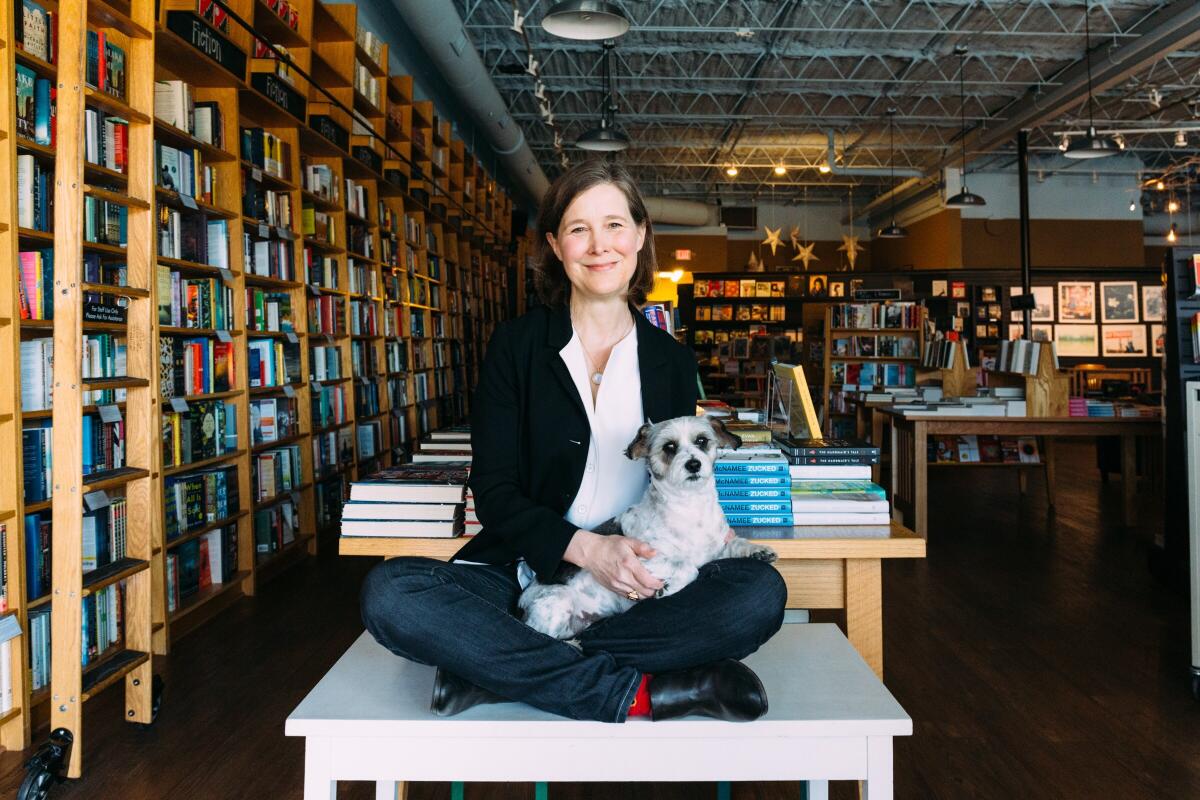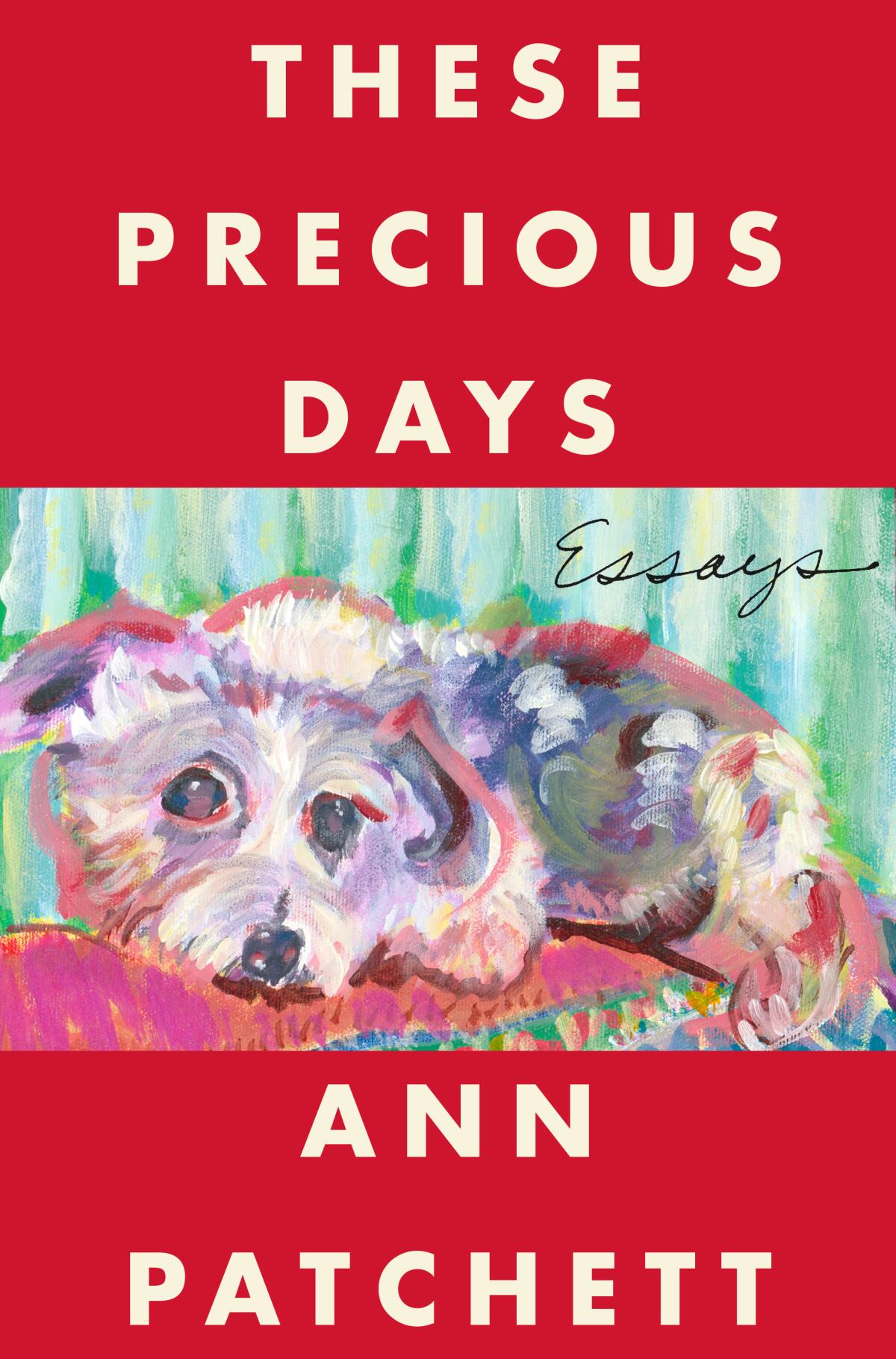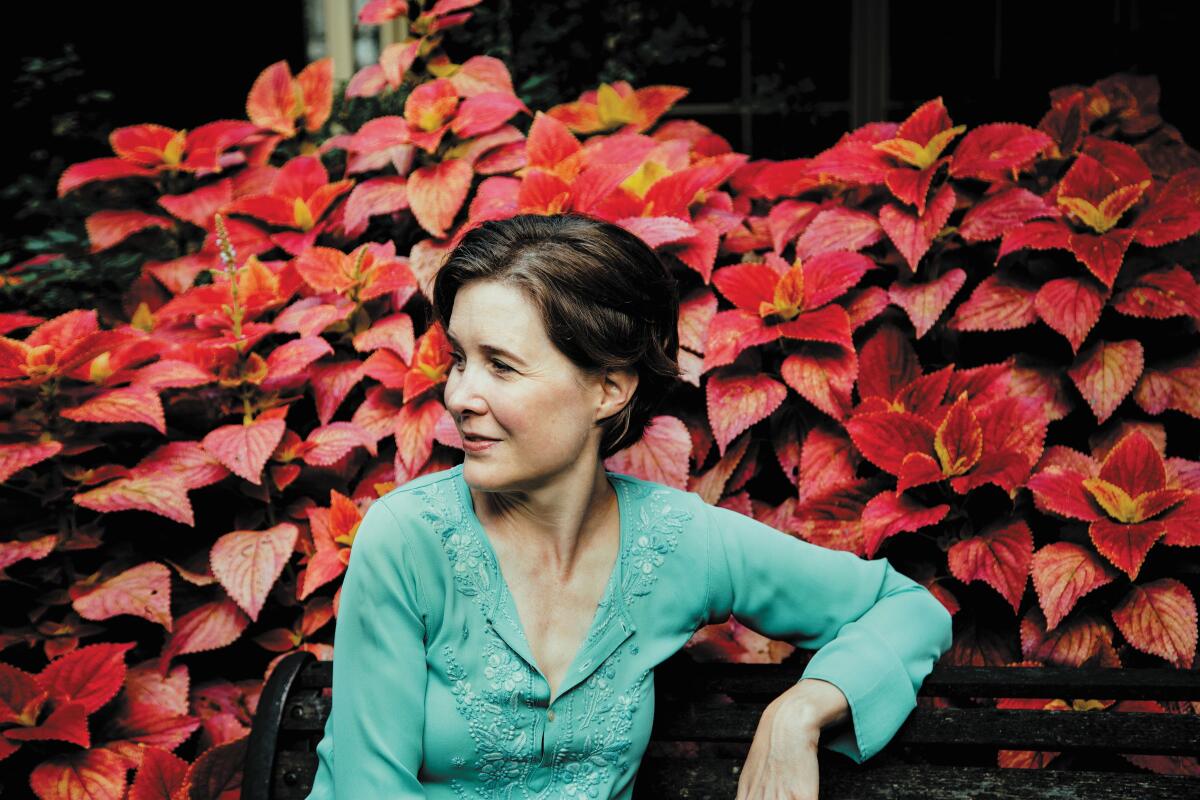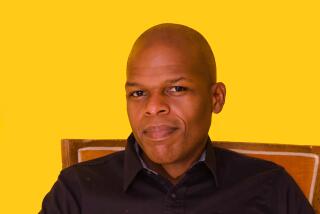Ann Patchett on why she isn’t doing a conventional book tour — possibly ever again

Ann Patchett is happy at home.
The bestselling novelist is publishing her second book of essays, but she has no plans to go on a conventional book tour — possibly ever again. Instead, she is happy to meet virtually with readers and reporters from her home in Nashville, where she has largely remained since March 2020, when the pandemic forced her to cut short a tour for her latest novel, “The Dutch House.”
“I’m very glad to know at the end of every day that I am not going to be sleeping in a Marriott,” she says in a Zoom call, comfortably perched on a tapestry-covered chair in her den, daylight streaming in through high windows. “And I’m getting to talk to ultimately a ton more people.”
Patchett will meet with the Los Angeles Times Book Club on Dec. 9 — virtually, of course.
In “These Precious Days,” Patchett traces her influences and inspirations from her birth in Los Angeles to a childhood in Nashville and an education at Sarah Lawrence College and the Iowa Writers’ Workshop. Her mother, a nurse, and father, a Los Angeles police detective, separated when she was 5, and she was raised largely by her mother and stepfather, a doctor and aspiring novelist who buried gold coins in the yard and stashed guns throughout the house. She saw her father annually on trips back to California, and his strong moral imperative (she describes him as “the editor”) had a lasting impact on her work, which includes her breakthrough novel “Bel Canto” and the semi-autobiographical “Commonwealth.”

Patchett has been widely celebrated for her literary fiction and nonfiction, winning induction into the American Academy of Arts and Letters, among other honors. But don’t go looking for steamy sex scenes in the works of a writer whom a critic once described as possessing “indefatigable niceness.”
“As a writer, I am first and foremost my father’s daughter,” Patchett writes. “I found plenty of things to write about that weren’t smoking or swearing or sex. With the extra time and energy they had, my characters went out and saw the world.”
Patchett’s good-hearted nature is on full display in the title essay of her new book, a portrait of her friend Sooki Raphael, the personal assistant of Tom Hanks.
Patchett met Raphael when she and Hanks appeared together at an event in Washington, D.C., the novelist interviewing the actor, who had recently published “Uncommon Type,” his own book of short stories. The account of how the actor’s intensely private personal assistant slowly revealed herself to Patchett is powerfully moving. It’s the story of a deep, late-in-life friendship forged in the intense isolation of the pandemic and Raphael’s cancer treatment. Raphael lived with Patchett for three months while she was being treated at a Nashville hospital.
While she never lost sight of people suffering from the pandemic, Patchett and her husband, Karl, felt fortunate to be marooned at home with a fascinating stranger whom they came to love dearly. “The luck and the fortune of my life was just overwhelming,” Patchett says. “And the key was that she was with us when she could have been with 100 other people who would have wanted her. She could have been shipwrecked on their island, and somehow she got shipwrecked on ours, and we all felt so lucky.”
Patchett says she knew early on that she wanted to write about her friend. The resulting essay, the book’s longest, was published this year in Harper’s Magazine. The cover headline: “An essay about Tom Hanks, tornadoes, running bookstores, taking mushrooms, making art in quarantine, stories without endings, and an unlikely friendship.”
“It meant so much to her to be seen,” Patchett says of Raphael. “She couldn’t believe that was the way I saw her. In a way, I was painting a picture of her. And then she gave it to all of her friends, and they all said, ‘No, that’s exactly how you are. That’s how we see you too.’”

Patchett paints other memorable pictures in the book, starting with the opening essay, “Three Fathers,” a group portrait of her father and two stepfathers. She reflects on literary influences as diverse as Eudora Welty, children’s author Kate DiCamillo and cartoonist Charles M. Schulz. She recounts her year of no shopping and her later, pandemic-inspired quest to rid herself of some worldly possessions. She writes of her decision not to have children, and the often-insensitive remarks of people who can’t understand such a choice.
Patchett has a unique vantage point on book promotion as an author who also co-owns a bookstore. Patchett and business partner Karen Hayes opened Parnassus Books in Nashville a decade ago, and she has described the venture as one of her life’s greatest accomplishments. “I believe I’ve done more good on behalf of culture by opening Parnassus than I have writing novels,” she writes in an essay based on a speech to graduate school deans — one of the book’s funniest. “I’ve made a place in my community where everyone is welcome.”
While the pandemic has been brutal on many small businesses, Parnassus was able to pivot to online sales, curbside pickup and virtual events. “Bookstores persevere,” Patchett says. “Based on the bookstore owners that I know around the country, everybody did OK.”
Not only did Parnassus survive financially, Patchett and Hayes were able to continue supporting all their employees, with no layoffs, throughout the pandemic. “I had such a sense of purpose,” Patchett says, “that, OK, I can’t save a lot of people, but I can take care of my people, and do everything that I can do — which is a lot — to make sure this business doesn’t go under. That I can keep these people employed and insured. That was great.”
Going forward, Patchett is hoping to see the emergence of a hybrid book-tour model, where some authors who wouldn’t necessarily have come to the bookstore in person continue to appear by Zoom. Patchett, who said she is beginning work on a new novel, has no plans to resume in-person appearances for the foreseeable future.
“I’m an introvert,” she says. “And I’m an introvert who works from home. So I feel like I’ve been in training for this one my whole life. Tell me that I can’t leave my house? Oh yeah, I’m gonna be fine with that.”
The pandemic has changed her, Patchett says, perhaps in a way she wanted to be changed. “I don’t really think I need to go anywhere anymore.”
“Eudora Welty didn’t go anywhere. Emily Dickinson didn’t go anywhere,” she says. “The value of my life is that I can write books, and I’m going to get a lot more of them written in my house — and I have a great imagination.”
Book Club: Ann Patchett
What: Ann Patchett discusses “These Precious Days” with Times columnist Steve Lopez at the L.A. Times Book Club.
When: 6 p.m. PST, Dec. 9.
Where: This virtual event was live on Twitter, Facebook and YouTube. Watch now.
Newsletter: Join our community book club: latimes.com/bookclub
More to Read
Sign up for our Book Club newsletter
Get the latest news, events and more from the Los Angeles Times Book Club, and help us get L.A. reading and talking.
You may occasionally receive promotional content from the Los Angeles Times.






